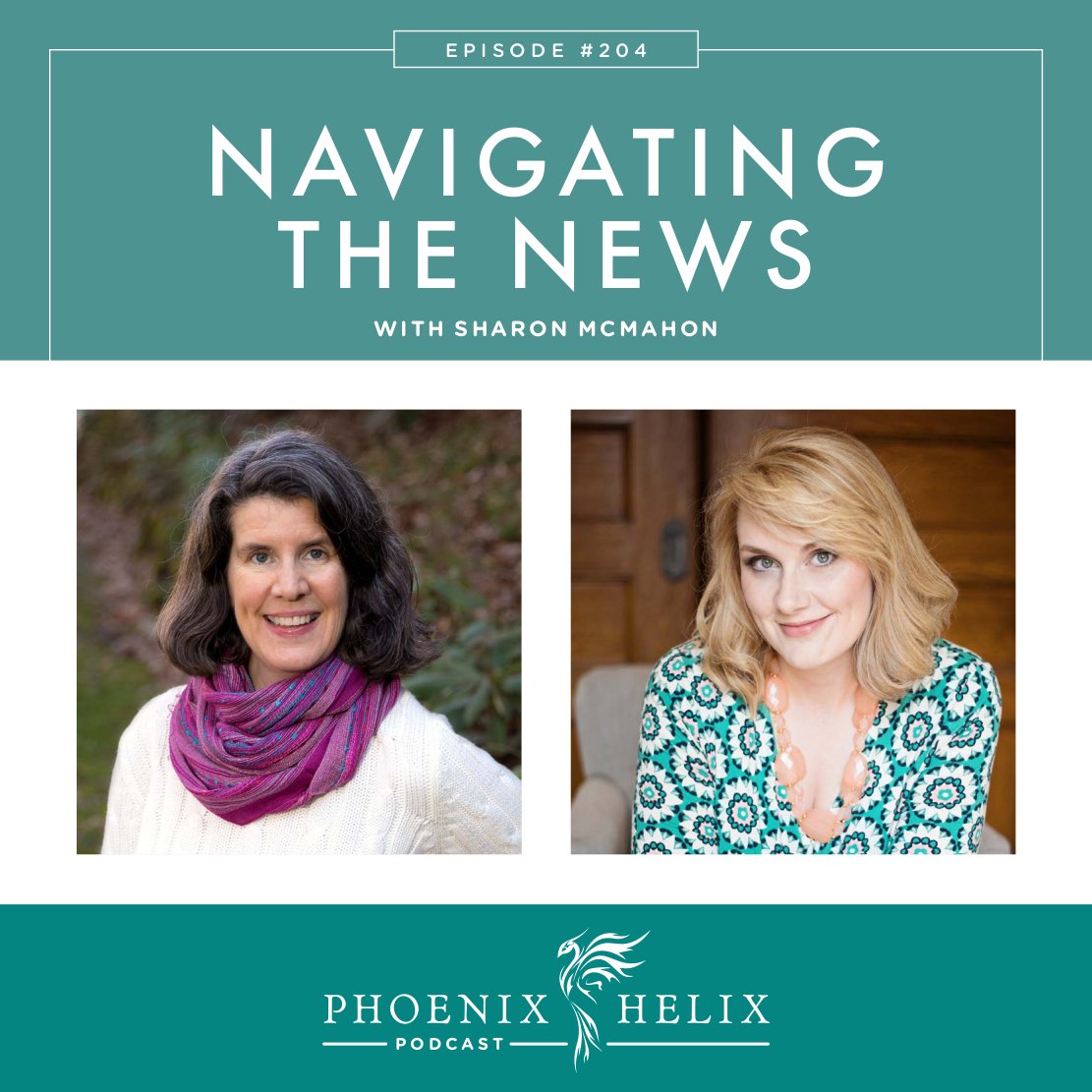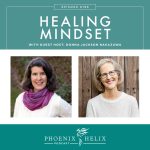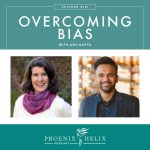Staying Informed Without Becoming Overwhelmed
If you ask people with autoimmune disease to name their biggest flare triggers, stress often tops the list. And if you ask people to name their top sources of stress, many people are overwhelmed by the news. Because of the 24-hour news cycle and the ability to be connected worldwide, we are inundated with a non-stop flow of news, and too often it’s filled with tragedy and injustice. Anxiety, outrage, and depression are very human responses, as well as a feeling of powerlessness. And if you have autoimmune disease, autoimmune flares might follow. Today’s podcast is NOT a news commentary episode. Instead, this is a life skill building episode – one that’s very important for emotional and physical health, and one that very few of us have. How do we consume the news in a way that keeps us accurately informed without becoming overwhelmed? How do we discern fake news from real news? And how do we break through feelings of powerlessness to see where we can make a difference in the world? These are big questions, and today I’m hoping we can start to find the answers. My guest is Sharon McMahon, who is often called ‘America’s Government Teacher’. Her mission is to share non-partisan information about democracy. You may know her from Instagram where she breaks down news headlines, world events, supreme court decisions, and government policy. To me, she’s a voice of reason in unreasonable times, and I’m grateful to have her on the podcast today. Update: Sharon now has a Substack Newsletter and a bestselling book: The Small and the Mighty.
Listen to the Show
- Subscribe to my podcast through your favorite podcast app: iTunes, Stitcher, Google, TuneIn, Spotify, Amazon, etc.
- You can also listen to the episode right here through the player below, and if you subscribe to my newsletter you’ll get notified of future episodes.
Podcast: Play in new window | Download
Show Notes
- Intro (0:00)
- Thank You To Our Podcast Sponsor – Luminance Skincare (3:11)
- It’s summer in the northern hemisphere, and this week, I’m highlighting their sunscreen and after-sun cream. Their sunscreen is made with only 3 ingredients: red raspberry seed oil, sunflower seed oil, and apricot kernel oil. The red raspberry seed oil absorbs the sun’s harmful energy before it penetrates the surface of your skin. I’ve tested this product myself, and I love it! It absorbs into the skin, so you don’t feel greasy, and it does indeed prevent sunburn. It has 250 5-star reviews for a reason! Their after-sun cream is designed to soothe burns. Our goal with sunshine is to get some vitamin D without burning our skin. But sometimes those plans go awry, especially if we’re at the beach or the pool all day and forget to reapply sunscreen. Luminance’s after-sun cream is designed to help heal sunburns. Tamanu oils accelerate healing. St. John’s Wort takes the sting away, and chamomile soothes the burn.
- Whereas conventional skincare products are full of chemicals that can hurt our bodies, Luminance is made from ingredients that nourish. It’s the cleanest skincare anywhere. Their products are natural, organic, wildcrafted, non-GMO, and gluten-free (and they’re even made in a dedicated gluten-free facility). They’re also handmade in small batches within the United States.
- They have a complete face and body care line, including cleansers, toners, moisturizers, masks, acne serum, sunscreen, haircare, and more.
- Place an order here, and use the code HELIX for 10% off your first order.
- Meet Sharon McMahon (5:13)
- Sharon McMahon is often called ‘America’s Government Teacher’. Her mission is to share non-partisan information about democracy.
- She has a hugely popular account on Instagram where she breaks down news headlines, world events, supreme court decisions, and government policy. If you aren’t on Instagram, she teaches online workshops and has a podcast as well. Update 2024: Sharon now also has a Substack Newsletter and a bestselling book: The Small and the Mighty.
- Sharon has a 20-year background as a law and government teacher, and she often worked with students who were court-ordered to go to school. The best way to interest them in the class was to discuss current events that were relevant in their lives, and she did so in a fact-based, non-biased way.
- In 2020, she realized that adults could use this form of education as well, and there was no public space for this type of conversation. Most people only followed news sources that matched their political views, and others stopped following the news altogether because it was too stressful and overwhelming. So, she took her teaching skills to social media and created a platform that quickly went viral, teaching in the same way she always taught her students in the past. It’s a safe place for people to get accurate news information without the overwhelm.
- Disinformation, Misinformation, and Media Bias (8:09)
- Fake news has become a politicized term, where people feel “the other side” is the one with the fake news and “their side” is the one with the truth. But misinformation exists on the internet on both sides of the political spectrum.
- Disinformation is when someone intentionally shares false information. They know they are lying, and want people to believe the lie.
- Misinformation is when someone unintentionally shares false information – they think it’s true and they share the information without fact-checking it first. This is very common on social media.
- Bias isn’t the same as disinformation. Bias is a default belief system about someone or something – and we all have bias. It’s a human quality and the way our brains offer shortcuts to help us navigate the world. Some biases are helpful, some are harmless, and others can be quite harmful. Becoming aware of our own biases gives us a conscious choice about whether we are comfortable with a particular bias or want to overcome it.
- Media outlets often have bias as well. This is not the same as fake news. News outlets often share accurate facts, but present them in a way that encourages the reader/viewer to have a certain opinion about those facts. While it is possible for a news outlet to have both bias and share disinformation, that’s not automatically the case. One thing Sharon does on her Instagram account is share different news headlines and photos reporting on the same event. They’re all sharing the same facts, but the choice of headline and photo surrounding those facts often shows the media bias. It’s a very educational exercise.
- Learning to distinguish the difference between these three things (disinformation, misinformation, and bias) – and identify them when you see them – is a core skill for navigating the news well. Fact-checking information before sharing it is also a core skill.
- Resource: Media Bias Chart from Ad Fontes Media. You can see where different news outlets fall on the left/right bias spectrum AND on the facts/disinformation spectrum.
- Facts Don’t Require Our Approval (23:25)
- Sharon is committed to presenting the news accurately in a neutral, non-biased way. But she’s also very clear that she’s not neutral on facts. Facts aren’t opinions.
- We may not like certain facts, but that doesn’t stop them from being true. Sometimes people try to dismiss and disbelieve facts they don’t like.
- Facts are often inconvenient and unwanted and can also be very upsetting. But another core skill of navigating the news well, is a willingness to accept the facts whether we like them or not. This allows us to see clearly what’s happening in the world, and make choices accordingly about how we want to respond.
- Fun note: Sharon talks about facts so frequently on her platform, that one of her fans has created stickers with some of Sharon’s quotes about facts.
- The Rare Times Sharon Won’t Present “Both Sides” (25:30)
- Neutrality can be taken too far. There are times when bias is appropriate, and trying to present “two sides” to certain topics would be unethical. This applies to horrifying events like genocide and slavery. Sharon will never look for “upsides” to these, and she is clear on her platform when this is the case.
- Thank You to Our Podcast Sponsor – Functional Nutrition Alliance (28:27)
- Full Body Systems is their internationally acclaimed, 10-month online functional nutrition immersion training program.
- It’s designed by world-renowned educator, Andrea Nakayama. Many of you know her as one of my most popular podcast guests. Her unique way of working with patients often leads to results where other practitioners hit dead ends. This program teaches you to do the same.
- If you’re already trained as a health coach, nutritionist, or medical practitioner and want to more effectively help your clients break through healing plateaus, this class is for you!
- And if you’re an aspiring practitioner just getting started, this might be the only training you need.
- You’ll gain detailed knowledge of all the systems in the body, how they interact, how problems develop, and how to personalize diet and lifestyle recommendations for each unique client.
- Enrollment is currently open. To learn more, visit FxNutrition.com/Eileen.
- Conspiracy Theories (29:51)
- Conspiracy theory researchers have found some commonalities among people vulnerable to these beliefs. Note: they don’t apply to everyone who believes in a conspiracy theory, but they apply to a lot of people.
- They tend to lack social capital – they may have very few friends and/or very low status in their social and work lives. Conspiracy theories give people a community where they are respected by others who share those beliefs.
- When the world feels wrong, overwhelming, and beyond their control, conspiracy theories offer a belief system that “makes sense” of the world.
- There’s an addictive quality to conspiracy theories. When you believe that only you and your community know the truth, there’s a positive neurochemical feedback loop. It’s very satisfying to believe that. Some conspiracy theory researchers say that the response in the brain is similar to other types of addictions.
- Conspiracy theories often become part of someone’s identity, and the strength of the belief is similar to the strength of someone’s religious beliefs.
- For these reasons, it’s very difficult to talk someone out of believing a conspiracy theory. Logic doesn’t work. Shame doesn’t work. You’re asking them to give up their community, their identity, their feeling of self-worth, and break through an addiction all at the same time. Criticizing someone’s beliefs usually strengthens those beliefs rather than dispelling them.
- We can also see why conspiracy theories rise in times of crisis, and why they increased during the pandemic, when people were socially isolated, frightened, confused about what was happening in the world, and feeling like they had no control.
- Knowing all of this, Sharon will still sometimes educate about a common conspiracy theory (like Qanon). Her goal isn’t to talk people out of it because that’s unlikely. Instead, her goals are: (1) To share facts, (2) To offer information to people who have friends or family members who have fallen victim to conspiracy theories, and (3) To provide a safe space in case someone wants to leave a false belief behind. She never shames people. She lets them know the facts and that it’s okay for them to change their mind.
- Political Polarization and Dehumanization (41:35)
- With political polarization, it’s common for people to believe that the opposite political party is evil.
- One of the things Sharon strives to do through her platform is to welcome people of diverse beliefs and to show respect for people as individuals. She believes it’s important to realize that members of political parties are not monoliths, and it’s dangerous to view each other that way.
- Dehumanization is when we stop seeing each other as people, and that never ends well.
- She often conducts polls on her platform on a specific issue and asks people to share their opinion along with their political leaning (conservative, liberal, moderate). Usually, there’s a wide variety of answers by people of the same political group. It shows nuance that doesn’t always show up in news headlines. And since most people spend the majority of their time with people of the same political beliefs, it’s a rare opportunity to see other people’s perspectives.
- Sharon Is Not Apolitical (48:29)
- When you learn that Sharon respects people of different beliefs and talks about the news in a calm, non-partisan way, you may misunderstand and think that calm voice encourages complacency. That’s not true.
- Sharon believes in democracy and political action. She wants people to be educated on the issues and inspired to make a difference in the world.
- By presenting the news in a way that’s accurate without being overwhelming, she gives people the mental space to consider how they want to respond to the news.
- Managing Your Stress Response to the News (49:06)
- Some people are addicted to the news and can’t stop watching. Others are so overwhelmed by the news they don’t watch it at all.
- Sharon believes that staying informed is important, but you can be mindful about how you get your information, and choose to consume news in a way that doesn’t harm your physical or emotional health.
- Television is often the most overwhelming way to get the news. They intentionally use music and language to amplify your emotional response.
- Instead, choose a news outlet you trust that presents the news in an accurate way that’s not designed to overwhelm. Update from Eileen: I now get my news from the 1440 daily newsletter. It leaves me feeling more informed and less inflamed, which is a great combination. They also include some good news every time.
- Then, follow your news consumption with something relaxing. On her platform, Sharon frequently shares videos of animals in between news headlines – either her dogs being funny, or animals in wildlife being majestic. This interrupts the stress response and allows people’s nervous systems to relax (including her own).
- Research supports this. News consumption increases anxiety, but if we follow that with relaxation, we can return our nervous systems to baseline. If we simply power through and follow the news with work or other tasks, our anxiety stays chronically higher, and chronic stress can be a root cause for autoimmune activity.
- Staying anxious doesn’t change the news. Instead, anxiety impairs logic. We are much more likely to see where we can make a difference in the world when we’re calm.
- Also look for good news. It’s out there. It’s just not shared as frequently. Here are some websites dedicated to good news:
- Making a Difference in the World (54:52)
- Often the world’s problems seem so huge that we feel too small to make a difference, so we don’t try at all. This is a very human feeling, and you’re not alone if you feel this way. Sharon reminds herself (and us) that most of the big, positive changes that have occurred in the world, happened as a result of the combined efforts of ordinary people doing small things consistently. We may not have much impact by ourselves, but we are very powerful together.
- Sharon’s advice is to ask yourself, “What is my role in this situation today? How can I help today?” Sometimes the answer is to rest and replenish. We can’t take care of others if we don’t take care of ourselves. This might be true if you’re in the middle of an autoimmune flare. Other times, you may have money to donate to an organization that is actively working on the problem. If you don’t have money to spare, you might share that organization’s fundraising information on social media, so other people can give. You might reach out to someone directly impacted and offer your support. There might be a political action you can take (an email, phone call, protest, or petition). Also look to your local community. National issues have a local impact, and working locally, we can often see progress more quickly.
- Resources:
- Article: 5 Tips for Cutting Through Overwhelm in the Face of World Tragedies. – This is a great article to keep bookmarked on your computer to reference when overwhelm hits. It gives you a step-by-step guide to move through it.
- Book: If you have my book, Healing Mindset, Chapter 23 is called “Caring for the World While Caring for Yourself.” It guides you through the process of choosing the cause that means the most to you, and the ways you can make an impact without sacrificing your autoimmune health.
- Podcast: Sharon has a series of episodes beginning with #146 called “Momentum: The Ripples Made by Ordinary People”.
- Outro (1:03:20)
- You can keep up with Sharon McMahon and her work through her website, podcast, Substack newsletter, Instagram, and in 2024, she wrote a bestselling book: The Small and the Mighty.
- Eileen (your podcast host) is the author of multiple books, written to help people thrive with autoimmune disease. Learn more on the Books Page.
- If you like this podcast, follow or subscribe through your favorite podcast app. You can also subscribe to Eileen’s biweekly newsletter.
- Check out the entire archive of podcast episodes.
You May Also Be Interested In
Spreading the Word
If you like the podcast, please leave a positive review in iTunes. It would mean the world to me, and also helps others find the podcast. Here are some quick instructions using your iPhone:
- If you are already subscribed to my podcast: (1) Click the purple podcast icon. (2) At the bottom of the screen, click Library. (3) At the top of the screen, click Shows. (4) Click the Phoenix Helix podcast image. (5) Scroll down the page, and you’ll see Ratings and Reviews. Scroll down a little bit more and click on Write a Review. This will bring up the review screen. Tap 5 stars (if you love the podcast), and then click in the title box, and it will bring up the keyboard. Enter a title and short review. (6) Click Send in the upper right corner. (7) Thank you! Positive reviews give the podcast a higher search ranking in iTunes, helping people find it and letting them know it’s a quality podcast and worth their time to listen.
- If you haven’t subscribed to my podcast: (1) Click the purple podcast icon. (2) In the lower right corner, click the magnifying class. (3) Type Phoenix Helix in the search box. (4) Click the podcast cover in the Show list. (5) If you’d like to subscribe, click the + sign at the top of the screen. (6) To write a review, scroll down the page, and you’ll see Ratings and Reviews. Scroll down a little bit more and click on Write a Review. This will bring up the review screen. Tap 5 stars (if you love the podcast), and then click in the title box, and it will bring up the keyboard. Enter a title and short review. (7) Click Send in the upper right corner. (8) Thank you! Positive reviews give the podcast a higher search ranking in iTunes, helping people find it and letting them know it’s a quality podcast and worth their time to listen.








